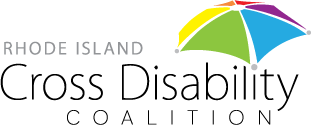Developmental Disabilities Employment Transformation Grant Success Stories: Workplace Examples that benefit both RI Businesses
and Eager Prospective Employees
Only one year ago the Rhode Island Cross Disability Coalition in conjunction with the Rhode Island Developmental Disability Council (RIDDC) and Skills for RI’s Future, launched RI Workforce Investment and New Solutions (RI WINS), a grant program focused on creating a new way of doing business that focuses on the needs of business. That new way of doing business has produced results within the service and the retail industries. At CareLink, Michael enlisted his tech talent within an office environment, and at Salvation Army, Tramell focused on his love of sneakers in their retail store. The multi-faceted approach of the program targets the needs of each business while focusing on each job candidate’s needs, talents, and ability to flourish in their work and personal lives.
According to RI WINS project manager, Sue Babin, “the ability of community agencies supporting people with disabilities to educate and train businesses to work with people with intellectual and developmental disabilities has clearly indicated that there is benefit to all in having a diverse and inclusive workforce. The participants are growing within their jobs, expanding their technical and interpersonal skills, and the workforce is getting the help they need.”
For a closer look at the two journeys, please review the RI WINS Employer Newsletter Issue 2, which explores the challenges and the successes.
With several businesses hiring job seekers with disabilities who have worked with job developers and coaches, the businesses have been open to making accommodations, when needed, some as minor as adjusting the time a shift begins. “The resulting workplace environment shows the flexibility of businesses to invest in making accommodations resulting in access to a more diverse talent pool to benefit the business, as well, “notes Babin.
While continuing the program in RI under the funding provided by the Division of Developmental Disabilities, Department of Behavioral Health, Developmental Disabilities and Hospitals (BHDDH), the goal of replicating this project nationally becomes increasingly more feasible. That its success has shown potential to benefit both employer and employee on so many levels make the program more promising.
Aware of the need to monitor and report outcomes, Babin also notes, “the stories we are beginning to share present a comprehensive picture of the individual as well as the business practicing the DEI goals and seeing positive results, a valuable and reliable employee, and a workplace enhanced by the new hire.”
At the same time, she admits, “changes within the organizations that work with the job seekers with disabilities and the businesses that need staffing do not happen overnight.” Beyond the two stories described, there are additional successes-in-the making. There is good reason to champion the process as well as the results.
